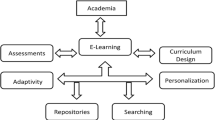Abstract
In recent years, the rapid development of internet technologies in educational resources requires some adaptability and customization of the learning methods. Still, there is some of the requirements are ignored in the traditional classroom while assessing the individual learners. Thus, the problem is to focus on the individual’s performance and provide a report regarding their learning pattern and behavior during the learning process. The main aim of this work is to employ personalization in e-learning systems to overcome the lack of monitoring the learner’s activities. Based on the learner’s learning history, the work retrieving the learning log of the user and identifying user profile information for the topic is used for profiling. The profiling of the user is based on the learner’s learning features obtained from the assessment. It is constructed as a profile to analyze the pattern in which the user behaves to determine their profile information. Based on the learning patterns of students, (KNC, RFC, and CNN classifiers) are used to label learners as good and Poor Learners.
Access this chapter
Tax calculation will be finalised at checkout
Purchases are for personal use only
Similar content being viewed by others
References
Web Reference. https://elearningindustry.com/benefits-of-artifcial-intelligence-in-personalized-learning
Wu D, Lu J, Zhang G (2015) A fuzzy tree matching-based personalized eLearning recommender system. IEEE Trans Fuzzy Syst 23(6):2412–2426
Imran H, Belghis-Zadeh M, Chang T, Graf KS (2016) PLORS: a personalized learning object recommender system. Vietnam J Comput Sci 3(1):3–13
Pardo A, Han F, Ellis RA (2017) Combining university student self-regulated learning indicators and engagement with online learning events to predict academic performance. IEEE Trans Learn Technol 10(1):82–92
Suguna S, Sundaravadivelu V (2018) An extensive survey on personalized and secured e-learning systems using data mining process. Int J Res Anal Rev (IJRAR) 6(1):664–667
Khribi MK, Jemni M, Nasraoui O (2008) Automatic recommendations for e-learning personalization based on web usage mining techniques and information retrieval. In: Eighth IEEE international conference on advanced learning technologies, pp 241–245
Agarwal R, Deo A, Das S (2004) Intelligent agents in e-learning. SIGSOFT Softw Eng Notes 29(2):1–9
Herath D, Jayaratne L (2017) A personalized web content recommendation system for E-learners in E-learning environment. In: National information technology conference (NITC)
Thai-Nghe N, Drumond L, Krohn-Grimberghe A, SchmidtThieme L (2010) Recommender system for predicting student performance. Proc Comput Sci 1(2):2811–2819
Imran H, Belghis-Zadeh M, Chang T-W, Kinshuk, Graf S (2016) PLORS: a personalized learning object recommender system. Vietnam J Comput Sci 3(1):3–13
Cakulaa S, Sedleniecea M (2013) Development of a personalized e-learning model using methods of ontology. In: ICTE in regional development, pp 113–120
Ali NA, Eassa F, Hamed E (2019) Personalized learning style for adaptive E-learning system. Int J Adv Trends Comput Sci Eng 8:223–230
Jenila Livingston LM, Merlin Livingston LM, Agnel Livingston LGX, Annie Portia A (2019) Personalized tutoring system for E-learning. In: 2019 international conference on recent advances in energy-efficient computing and communication (ICRAECC), pp 1–4
Giannakos MN, Mikalef P, Pappas IO (2021) Systematic literature review of E-learning capabilities to enhance organizational learning. Inf Syst Front
Sihombing J, Laksitowening K, Darwiyanto E (2020) Personalized E-learning content based on Felder-Silverman learning style model, pp 1–6
Joshi N, Gupta R (2020) A personalized web-based E-learning recommendation system to enhance and user learning experience. Int J Recent Technol Eng (IJRTE) 9(1):1186–1195. ISSN 2277-3878
Author information
Authors and Affiliations
Corresponding author
Editor information
Editors and Affiliations
Rights and permissions
Copyright information
© 2022 The Author(s), under exclusive license to Springer Nature Singapore Pte Ltd.
About this paper
Cite this paper
Christy Eunaicy, J.I., Sundaravadivelu, V., Suguna, S. (2022). Personalization and Prediction System Based on Learner Assessment Attributes Using CNN in E-learning Environment. In: Unhelker, B., Pandey, H.M., Raj, G. (eds) Applications of Artificial Intelligence and Machine Learning. Lecture Notes in Electrical Engineering, vol 925. Springer, Singapore. https://doi.org/10.1007/978-981-19-4831-2_28
Download citation
DOI: https://doi.org/10.1007/978-981-19-4831-2_28
Published:
Publisher Name: Springer, Singapore
Print ISBN: 978-981-19-4830-5
Online ISBN: 978-981-19-4831-2
eBook Packages: Computer ScienceComputer Science (R0)




